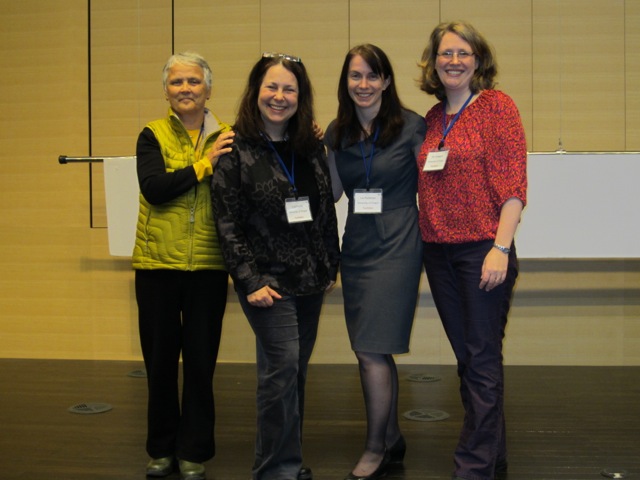UO Delegation Leads Faculty Development Event in Japan
A five-person delegation from the University of Oregon led a two-day faculty development workshop at Nagoya University March 16-17, 2013. The Japanese Ministry of Education’s Global 30 initiative sponsored the program. Launched in 2008, this high-profile initiative aims to internationalize Japanese higher education by creating new English-language degree programs, recruiting international students, and providing opportunities for Japanese students to study abroad. UO’s Center for Asian and Pacific Studies, which facilitated three earlier G-30 faculty development workshops at the University of Oregon, provided the planning and logistical support for the team that took this pioneering workshop on the road. Remarking on the success of the workshop, CAPS Director Jeff Hanes notes: “The UO faculty development team brought their energy and expertise to the steep pedagogical challenges facing Japan’s signature program for the internationalization of higher education—and made a significant impact.”
Oregon’s team worked with 40 Japanese and international faculty members from eight Japanese universities to improve their English presentation skills and learn about evidence-based best teaching practices, focusing particularly on making the classroom more interactive. Lee Rumbarger, Director of the Teaching Effectiveness Program (TEP); Trish Pashby, Senior Instructor at the American English Institute (AEI); Georgeanne Cooper, Former Director of the Teaching Effectiveness Program, and Elly Vandegrift, Associate Director of the Science Literacy Program (UO-SLP) co-facilitated the workshop. Highlighting the international nature of the G-30 initiative, the faculty participants were from 15 nations. CAPS Director Jeff Hanes accompanied the team, providing on-the-ground logistical support for the program. CAPS Assistant Director Lori O’Hollaren supervised planning of the operation, and East Asia Coordinator, Yifang Zhang, worked with organizers at Nagoya University to fine tune workshop organization and logistics.
The workshop weekend included small- and large-group sessions like “Interactive Lecture Techniques,” “Teaching in English,” “Teaching to a Diverse Student Audience,” “Learning Objectives and Backward Design,” and “The External Brain.” Each participant delivered a 10-minute mini-lecture in their fields of expertise incorporating interactive lecture techniques. The UO facilitators have expertise in each of these areas and offer training opportunities to graduate students and faculty at the UO on these topics.
During a closing discussion, participants articulated ideas from the workshop they planned to experiment with to incorporate big- and small-scale revisions in their own courses, such as incorporating midterm course evaluations, “minute-papers,” i-clickers, in-class demonstrations and a range of peer learning activities.
G-30 faculty members expressed satisfaction with the workshop and excitement about returning to their teaching with new ideas and drawing form the group’s collective energy. Some of the participants’ observations in a follow-up survey include:
“[I]nteractive, practical and encouraging atmosphere throughout session…I really liked being a student of very good teachers.”
“It was most stimulating to lean the importance of affirmative attitude to students. Interactive teaching is rare in the Japanese classes and most of the lectures including mine tend to be unidirectional. Teaching by questioning was a refreshing idea to me. Although I knew the importance of interaction in the class, I was not practical enough. Your lectures gave me lots of useful hints. I also liked the international atmosphere in the class thanks to many non Japanese participants.”
“The workshop was very impressive and helpful. Until now, I thought that university lectures were an opportunity to obtain knowledge written in a textbook through well-summarized teacher’s notes. Through the workshop, however, I could learn that a good lecture should be interactive, well organized, informative, and enjoyable. The teachers from University of Oregon showed me attractive lectures not only by clear speech, motions and good materials but also by kind answers to any questions. I deeply appreciate their efforts and passions.”
UO’s faculty development relationship with this group began in 2010 when CAPS paired TEP and AEI with administrators and faculty from Nagoya University looking to improve teaching on their campus. Over the past three years, 18 Nagoya University faculty and administrators have participated in multiday training programs on the University of Oregon campus. The March 2013 program was the first time that faculty from TEP, AEI, UO-SLP, and CAPS have been invited to Nagoya University to facilitate a workshop on that campus.

